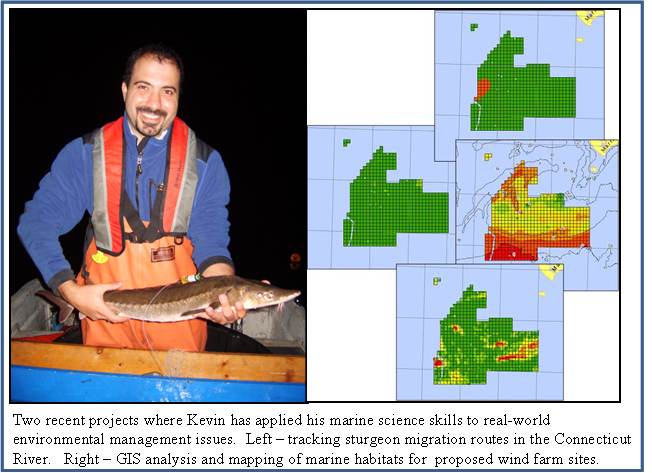Bachelor of Arts – 2004

What do you do for a living?
Shortly after graduation I started an environmental internship with at the CT Department of Environmental Protection, Office of Long Island Sound Programs. I was given the chance to work on multiple projects, which included enhancing the state’s ability to preserve sensitive coastal areas and projects that implemented Connecticut’s Coastal Zone Management Act. After my internship I started at and have remained employed with Kleinschmidt Associates, an energy and water resources consulting firm. My job duties vary with each project. I have provided assistance in baseline environmental studies for the relicensing of federally regulated hydroelectric projects, performed baseline analysis for the Clean Water Act, and worked on offshore renewable energy projects among other duties.
In 2007 I returned to school and am currently working towards a PhD in Geography. I’m researching techniques for optimizing the energy yield of offshore renewable energy projects (including wind and tidal), while minimizing adverse environmental, economic and social impacts. The interdisciplinary nature of my undergraduate education has proven beneficial, and is providing a strong foundation for my current work and research.
What’s the most interesting thing you’ve done/learned in your marine sciences career?
The most interesting aspect of my current job is the breadth of topics I have experienced. I’m always learning new methods and techniques, and applying them to my work. I’ve gotten the chance to travel to many locales in different environments, but lately I’ve been given the chance to participate in exciting new industries. Offshore renewable energy technologies are starting to become viable enough for production sized facilities. The industry is very close to the production of renewable energy in our coastal areas. My colleagues and I are working to make sure these developments adhere to policy and minimize the disruption of natural processes.
What aspect(s) of the UConn Marine Sciences Program uniquely prepared you for your success?
The aspect of the program I believe was most instrumental in getting me to where I am now was the emphasis on interdisciplinary studies. The program’s core was the study on the ecological, biochemical and physical processes occurring in the coastal zone, but it also offered me further study in the social, regulatory, and economic policies in place to manage our coastal zone. This interdisciplinary background has provided a strong foundation for my career and research. It has allowed me to remain flexible and respond to new tasks, these are skills fundamental for consulting.
For more information on where Kevin works and what he does………..